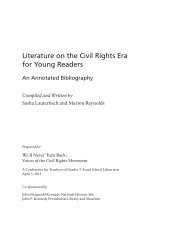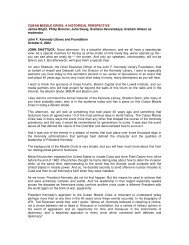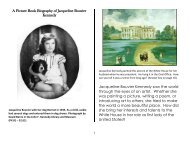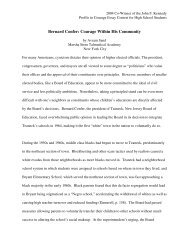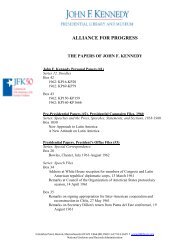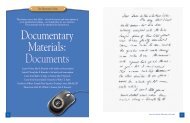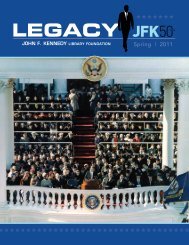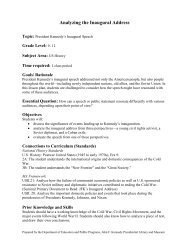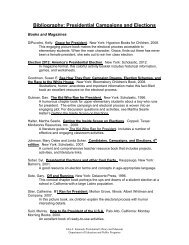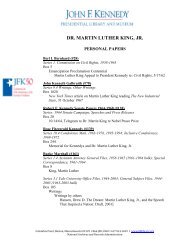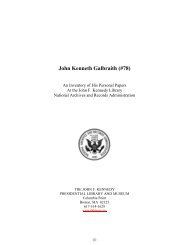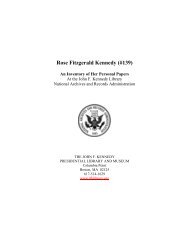- Page 1 and 2: HEMINGWAY'S LIBRARY 1
- Page 3 and 4: 1981 James D. Brasch and Joseph Sig
- Page 5 and 6: For Daniella and Delores 5
- Page 7 and 8: ILLUSTRATIONS I . Inscriptions in g
- Page 9 and 10: Frances Reed, Michael S. Reynolds,
- Page 11 and 12: other used the library at a very ea
- Page 13 and 14: always be "in supply." When he ran
- Page 15: the 1930's: He wanted to know every
- Page 19 and 20: of critical emphasis. What Benson e
- Page 21 and 22: windswept street, this was a warm c
- Page 23 and 24: eak up with Pauline, Hemingway was
- Page 25 and 26: mice, rats and many cockroaches whi
- Page 27 and 28: and his four-viewed workroom and re
- Page 29 and 30: in January 1977. At that time, we w
- Page 31 and 32: 7. kwfv: List of books shipped from
- Page 33 and 34: V. Methods and Procedures Cards wer
- Page 35 and 36: NOTES Some notes use the following
- Page 37 and 38: ` 42. T.S. Eliot, "Tradition and th
- Page 39 and 40: Bernard F. Rodgers, Jr., "The Nick
- Page 41 and 42: 110. Later this building was sold a
- Page 43 and 44: three copies were made from Dr. Kan
- Page 45 and 46: COMPOSITE RECORD OF HEMINGWAY'S LIB
- Page 47 and 48: 36. Aflalo, Frederick George, ed. S
- Page 49 and 50: 77. Alger, Horatio. Rufus and Rose,
- Page 51 and 52: 122. -----. Judgement on Deltchev.
- Page 53 and 54: 169. Andrews, Wayne. Battle for Chi
- Page 55 and 56: 209. Arguilla, Manuel Estabillo. Ho
- Page 57 and 58: Game Cock. Bath: Bayntun, 1938. FV
- Page 59 and 60: B.B., pseud. See Watkins-Pitchford,
- Page 61 and 62: kwfv FV 339. Balch, Glenn. Hide-rac
- Page 63 and 64: Max Eastman. New York: Putnam, 1945
- Page 65 and 66: 422. Bates, William Horatio. The Cu
- Page 67 and 68:
466. Bee, Clair Francis. The Basket
- Page 69 and 70:
510. -----. Now I Lay Me Down to Sl
- Page 71 and 72:
Berkeley, Antony, pseud. See Cox, A
- Page 73 and 74:
597. Bible. The New Testament of Ou
- Page 75 and 76:
641. Blaikie, William Garden. The P
- Page 77 and 78:
688. -----. The Most Pleasant and D
- Page 79 and 80:
731. Borsetta, Francesco. Per curar
- Page 81 and 82:
Letters among the North Americans.
- Page 83 and 84:
814. Breyer, Victor. Annuaire du ri
- Page 85 and 86:
-----, joint author. See Schmitt, M
- Page 87 and 88:
903. -----. The Turn of the Tide: A
- Page 89 and 90:
949. Buono, Oreste del. La parte di
- Page 91 and 92:
991. Burton, Richard Francis. First
- Page 93 and 94:
1035. -----. Sinful Woman. New York
- Page 95 and 96:
1080. Cannon, James J. Nobody Asked
- Page 97 and 98:
1126. *Carr, Peter. Messages. U.S.A
- Page 99 and 100:
1172. -----. Another copy. FV 1173.
- Page 101 and 102:
1215. -----. Mrs. Cadwell habla con
- Page 103 and 104:
1259. Charbonneau, Robert. La Franc
- Page 105 and 106:
1304. -----. La crisi mondiale. KW
- Page 107 and 108:
1351. Clift, Charmian, and George J
- Page 109 and 110:
1394. Coles, Kaines Adlard. Sailing
- Page 111 and 112:
1436. -----. Another copy. b/s tape
- Page 113 and 114:
1487. -----. When Dragons Roamed Ea
- Page 115 and 116:
1531. Cox, William Drought, ed. Box
- Page 117 and 118:
Modern Military, Target and Sportin
- Page 119 and 120:
1616. Dakers, James Silver. Simple
- Page 121 and 122:
1663. -----. A Gentleman Called. Ne
- Page 123 and 124:
1947. FV 1704. -----. Gourmet's Coo
- Page 125 and 126:
1750. -----. The Literary Fallacy.
- Page 127 and 128:
1793. Dodd, William E. Ambassador D
- Page 129 and 130:
1836. -----. The Diary of a Writer.
- Page 131 and 132:
1883. -----. The Royal Succession.
- Page 133 and 134:
1928. -----. The Yankees: A Pictora
- Page 135 and 136:
Eye-witnesses and Contemporaries. I
- Page 137 and 138:
2020. -----. The Sling and the Arro
- Page 139 and 140:
2063. Faherty, Robert. Better than
- Page 141 and 142:
2110. -----. Light in August. KW 21
- Page 143 and 144:
2157. -----. Mexico Revisited. New
- Page 145 and 146:
2202. Finch, Percy. Shanghai and Be
- Page 147 and 148:
2246. -----. One's Company: A Journ
- Page 149 and 150:
2290. -----. Another copy. KW 2291.
- Page 151 and 152:
2334. -----. De Misdaad van Sylvest
- Page 153 and 154:
2377. Frings, Ketti. Look Homeward,
- Page 155 and 156:
2416. -----. The White Monkey. New
- Page 157 and 158:
2464. Gary, Romain. The Company of
- Page 159 and 160:
Flanagan, 1902. PC 2511. -----, eds
- Page 161 and 162:
Gilbert, James Z., joint author. Se
- Page 163 and 164:
2597. -----. Raiders of the Rimrock
- Page 165 and 166:
2644. Goncourt, Edmond and Jules de
- Page 167 and 168:
2687. -----. Thirty Tales and Sketc
- Page 169 and 170:
2735. -----. Stamboul Train: An Ent
- Page 171 and 172:
2749. Grey, Edward. The Charm of th
- Page 173 and 174:
2785. Guggenheim, Marguerite (Peggy
- Page 175 and 176:
2823. -----. Inside Europe. New Yor
- Page 177 and 178:
2855. Haig-Brown, Roderick L. Fishe
- Page 179 and 180:
2888. Hamilton, Elizabeth. Put Off
- Page 181 and 182:
2921. Hardy, Thomas. The Return of
- Page 183 and 184:
2953. Hart, Henry. The Great One: A
- Page 185 and 186:
2985. -----. Another copy. KW 2986.
- Page 187 and 188:
3023. Heath, William L. Violent Sat
- Page 189 and 190:
3055. Hentoff, Nat, and Albert J. M
- Page 191 and 192:
3091. Hickey, Joseph James. A Guide
- Page 193 and 194:
FV 3135. -----. Another copy. FV 31
- Page 195 and 196:
3174. Hough, Richard Alexander. Adm
- Page 197 and 198:
3222. Hume, Martin Andrew Sharp. Th
- Page 199 and 200:
3271. Hydrick, John Lee. Intensive
- Page 201 and 202:
University of Oklahoma, 1944. FV 33
- Page 203 and 204:
3359. Jaynes, Clare [pseud.]. The E
- Page 205 and 206:
States by Joseph E. Johnston, Gener
- Page 207 and 208:
3443. Jurisprudencia civil: Colecci
- Page 209 and 210:
3491. Károlyi, Mihály. Memoirs of
- Page 211 and 212:
York: Fischer, 1946. FV 3535. Key W
- Page 213 and 214:
3578. Klein, Alexander, ed. The Dou
- Page 215 and 216:
3622. Krasnov, Petr Nikolaevich. Fr
- Page 217 and 218:
3665. Lagin, Lazar= Iosifovich. The
- Page 219 and 220:
3711. Langewiesche, Wolfgang. A Fli
- Page 221 and 222:
3755. -----. The Portable D.H. Lawr
- Page 223 and 224:
3803. Leighton, George Ross. Five C
- Page 225 and 226:
3848. -----. Another copy. KW 3849.
- Page 227 and 228:
3895. Life (periodical). Picture Hi
- Page 229 and 230:
3939. -----. Retreat from Glory. Ne
- Page 231 and 232:
3983. Lowell, Amy. Tendencies in Mo
- Page 233 and 234:
Lyman, Dorothy, joint author. See B
- Page 235 and 236:
4075. -----. Patrol. London: Fontan
- Page 237 and 238:
4120. -----. Conquistador. [Typescr
- Page 239 and 240:
4167. Mainwaring, Daniel [Geoffrey
- Page 241 and 242:
4218. Manning, Frederic. Her Privat
- Page 243 and 244:
4260. -----. To the Bullfight: A Gu
- Page 245 and 246:
Martin, Robert Grant, joint editor.
- Page 247 and 248:
4352. Matisse, Henri. Matisse: Seiz
- Page 249 and 250:
Germany. New York: Doubleday, Doran
- Page 251 and 252:
4451. -----, ed. Cultural Patterns
- Page 253 and 254:
FV 4497. -----. The Sky Suspended:
- Page 255 and 256:
4540. Millikan, Robert Andrews, and
- Page 257 and 258:
4586. Mochi, Ugo, and Thomas Donald
- Page 259 and 260:
4633. Montres Rolex S.A. Rolex Jubi
- Page 261 and 262:
4683. Morgan, Albert. Cast of Chara
- Page 263 and 264:
4728. Muldoon, Guy. Leopards in the
- Page 265 and 266:
1941. FV 4775. Needham, Paul Robert
- Page 267 and 268:
4823. -----. Picasso: Forty Years o
- Page 269 and 270:
4868. Nin, Anaïs. The Winter of Ar
- Page 271 and 272:
4911. Nyabongo, Akiki K. The Story
- Page 273 and 274:
4954. -----. The Doctor's Son and O
- Page 275 and 276:
4999. -----, and Ventura Bagüés [
- Page 277 and 278:
5045. Packard, Vance Oakley. The St
- Page 279 and 280:
5088. Pataky, László. Los duros:
- Page 281 and 282:
5133. -----. Lagartijo y Frascuelo
- Page 283 and 284:
5173. -----. Field Guide to the Bir
- Page 285 and 286:
5207. Pictorial History of the Seco
- Page 287 and 288:
5241. Plymouth, Conn., 1795-1895: S
- Page 289 and 290:
5273. Porter, William Sydney [0. He
- Page 291 and 292:
5308. -----. Profile: An Anthology
- Page 293 and 294:
5343. Pratt, Joseph Gaither, J.B. R
- Page 295 and 296:
5380. Pugh, Marshall. Frogman: Comm
- Page 297 and 298:
5414. Quiller-Couch, Arthur Thomas.
- Page 299 and 300:
5448. Ramsey, Frederic, and Charles
- Page 301 and 302:
5483. Reade, Charles. The Cloister
- Page 303 and 304:
Reilly, Lawrance, joint author. See
- Page 305 and 306:
5549. Richards, Frank. Old Soldiers
- Page 307 and 308:
"Robert-Robert," pseud. See Burnand
- Page 309 and 310:
Scribner, 1947. FV 5638. -----. Mor
- Page 311 and 312:
5680. Roske, Ralph Joseph, and Char
- Page 313 and 314:
5725. Ruiz Vilaplana, Antonio. Doy
- Page 315 and 316:
5775. Saltus, Edgar Evertson. Imper
- Page 317 and 318:
5818. Sannazaro, Jacopo. Poemata, e
- Page 319 and 320:
Md.: Cornell Maritime, 1954. FV 586
- Page 321 and 322:
5910. -----. Behind the Urals: An A
- Page 323 and 324:
5953. Serpa, Enrique. Contrabando:
- Page 325 and 326:
5997. -----. Two Weeks in Another T
- Page 327 and 328:
6043. -----. Another copy. FV Short
- Page 329 and 330:
6092. omitted 6093. -----. Le passa
- Page 331 and 332:
6140. -----. Roumanian Journey. KW
- Page 333 and 334:
Smith, Reed, joint editor. See Cros
- Page 335 and 336:
6225. Sokoloff, Boris. The Miracle
- Page 337 and 338:
Schricke. Paris: Payot, 1927. ph ph
- Page 339 and 340:
6313. -----. Lucy Church, Amiably.
- Page 341 and 342:
6356. -----. Storm: A Novel. Washin
- Page 343 and 344:
6399. Strunk, William, and E.B. Whi
- Page 345 and 346:
6442. Taber, Gladys, and Ruth Kistn
- Page 347 and 348:
Temple, Dan, pseud. See Newton, Dwi
- Page 349 and 350:
6530. Thompson, Oscar, ed. The Inte
- Page 351 and 352:
6575. Tong, Hollington Kong. Chiang
- Page 353 and 354:
6617. Trenker, Luis. La guerre au T
- Page 355 and 356:
6665. *Turrent Rozas, Lorenzo. Cami
- Page 357 and 358:
6706. U.S. National Gallery of Art.
- Page 359 and 360:
6747. Uris, Leon M. The Angry Hills
- Page 361 and 362:
6791. Vandercook, John Womack. The
- Page 363 and 364:
1851-1891. New York: Random House,
- Page 365 and 366:
6877. -----. The Twilight of the El
- Page 367 and 368:
6920. The War in Italy. No.18: Arms
- Page 369 and 370:
6965. -----. Vile Bodies. Boston: L
- Page 371 and 372:
7010. -----. The Bulpington of Blup
- Page 373 and 374:
7057. Wetzel, Donald. The Age of Li
- Page 375 and 376:
7101. -----. They Were Expendable.
- Page 377 and 378:
7147. Williams, Tennessee. Baby Dol
- Page 379 and 380:
7194. Wilson, Gill Robb. The Airman
- Page 381 and 382:
7237. -----. Battle for the Solomon
- Page 383 and 384:
7285. Wordsworth, William. The Prel
- Page 385 and 386:
7327. -----. Dramatis Personae, 189
- Page 387 and 388:
7368. -----. The World of Yesterday
- Page 389 and 390:
Africa, West, 413, 2668, 2729, 3263
- Page 391 and 392:
African, 413 anatomy, 4679 angling
- Page 393 and 394:
6180, 6366, 6367, 6613, 7079 Chicag
- Page 395 and 396:
Book publishing, 18, 1002, 6014 Boo
- Page 397 and 398:
Catastrophes, 3785 Cathedrals Burgo
- Page 399 and 400:
Italian, 3967 Spanish, 5147 Coopera
- Page 401 and 402:
David, King of Israel, 1473 Day, J.
- Page 403 and 404:
Episcopal Church, 716 Erosion, 5014
- Page 405 and 406:
3680, 4236, 6484, 6514 Pacific, 125
- Page 407 and 408:
Fuller, Margaret, 1760 Fur trade, 1
- Page 409 and 410:
Arthur, 7095 Charles I, 5682 Cromwe
- Page 411 and 412:
Holborn, Hajo, 951 Holingshed Rapha
- Page 413 and 414:
Mayas, 5429, 6526, 6750 Mesa Verde,
- Page 415 and 416:
Kelly-Roosevelt-Field Museum Expedi
- Page 417 and 418:
Locke, John, 2960 (vol. 37) Logic,
- Page 419 and 420:
sanitary affairs, 2489 shock therap
- Page 421 and 422:
Murrow, Edward R., 1155, 6508 Murry
- Page 423 and 424:
Nute, Grace Lee, 3960 Nutrition, 11
- Page 425 and 426:
Plevna, Siege of, 2395 Pliny, the E
- Page 427 and 428:
Rascoe, Burton, 192 Reavey, George,
- Page 429 and 430:
economic conditions, 4285, 6633 for
- Page 431 and 432:
Slessor, John, 1359 Smith, Adam, 29
- Page 433 and 434:
Strong, L.A.G., 2396 Stuart, James
- Page 435 and 436:
Army, 508, 1859, 1925, 2039, 2282,
- Page 437 and 438:
Washington, D.C., 116, 1235, 3150,
- Page 439 and 440:
tanks, 6021 Turkey, 4099, 4656 Unit
- Page 441:
Zayas, Fernando de, 898 Zeebrugge,



